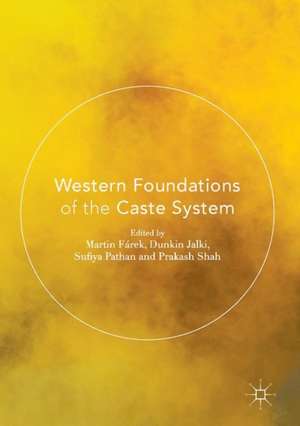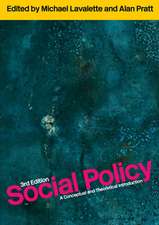Western Foundations of the Caste System
Editat de Martin Fárek, Dunkin Jalki, Sufiya Pathan, Prakash Shahen Limba Engleză Hardback – 20 iul 2017
The dominant descriptions of the ‘caste system’ that we have today are results of originally Christian themes and questions. The authors of this collection show how this hypothesis can be applied beyond South Asia to the diasporic cultures that have made a home in Western countries, and how the inheritance of caste studies as structured by European scholarship impacts on our understanding of contemporary India and the Indians of the diaspora.
This collection will be of interest to scholars and students of caste studies, India studies, religion in South Asia, postcolonial studies, history, anthropology and sociology.
| Toate formatele și edițiile | Preț | Express |
|---|---|---|
| Paperback (1) | 469.41 lei 38-44 zile | |
| Springer International Publishing – 28 iul 2018 | 469.41 lei 38-44 zile | |
| Hardback (1) | 699.59 lei 6-8 săpt. | |
| Springer International Publishing – 20 iul 2017 | 699.59 lei 6-8 săpt. |
Preț: 699.59 lei
Preț vechi: 823.05 lei
-15% Nou
Puncte Express: 1049
Preț estimativ în valută:
133.87€ • 140.12$ • 111.42£
133.87€ • 140.12$ • 111.42£
Carte tipărită la comandă
Livrare economică 31 martie-14 aprilie
Preluare comenzi: 021 569.72.76
Specificații
ISBN-13: 9783319387604
ISBN-10: 331938760X
Pagini: 276
Ilustrații: XI, 274 p.
Dimensiuni: 148 x 210 mm
Greutate: 0.49 kg
Ediția:1st ed. 2017
Editura: Springer International Publishing
Colecția Palgrave Macmillan
Locul publicării:Cham, Switzerland
ISBN-10: 331938760X
Pagini: 276
Ilustrații: XI, 274 p.
Dimensiuni: 148 x 210 mm
Greutate: 0.49 kg
Ediția:1st ed. 2017
Editura: Springer International Publishing
Colecția Palgrave Macmillan
Locul publicării:Cham, Switzerland
Cuprins
1. Introduction: Caste Studies and the Apocryphal Elephant; Martin Farek, Dunkin Jalki, Sufiya Pathan andPrakash Shah.- 2. Caste-Based Reservation and Social Justice in India ; S.N. Balagangadhara.- 3. Are there Caste Atrocities in India? What the Data Can and Cannot Tell Us; Dunkin Jalki and Sufiya Pathan.- 4. Dissimulating on Caste in British Law; Prakash Shah.- 5. Were Shramana and Bhakti Movements Against the Caste System?; Martin Farek.- 6. A Nation of Tribes and Priests: The Jews and the Immorality of the Caste System Jakob De Roover.- 7. The Aryans and the Ancient System of Caste; Marianne Keppens.- 8. Afterword; Martin Farek, Dunkin Jalki, Sufiya Pathan and Prakash Shah.
Notă biografică
Martin Fárek is the Head of the Department for the Study of Religions, University of Pardubice, Czech Republic.
Dunkin Jalki is the Director of the Centre for Interdisciplinary Research in Humanities and the Social Sciences, SDM PG College, Ujire, India.
Sufiya Pathan is Associate Professor at the Centre for Interdisciplinary Research in Humanities and the Social Sciences, SDM PG College, Ujire, India.
Prakash Shah is a Reader in Culture and Law, Queen Mary, University of London, UK.
Dunkin Jalki is the Director of the Centre for Interdisciplinary Research in Humanities and the Social Sciences, SDM PG College, Ujire, India.
Sufiya Pathan is Associate Professor at the Centre for Interdisciplinary Research in Humanities and the Social Sciences, SDM PG College, Ujire, India.
Prakash Shah is a Reader in Culture and Law, Queen Mary, University of London, UK.
Textul de pe ultima copertă
This book argues that the dominant descriptions of the ‘caste system’ are rooted in the Western Christian experience of India. Thus, caste studies tell us more about the West than about India. It further demonstrates the imperative to move beyond this scholarship in order to generate descriptions of Indian social reality.
The dominant descriptions of the ‘caste system’ that we have today are results of originally Christian themes and questions. The authors of this collection show how this hypothesis can be applied beyond South Asia to the diasporic cultures that have made a home in Western countries, and how the inheritance of caste studies as structured by European scholarship impacts on our understanding of contemporary India and the Indians of the diaspora.
This collection will be of interest to scholars and students of caste studies, India studies, religion in South Asia, postcolonial studies, history, anthropology and sociology.
The dominant descriptions of the ‘caste system’ that we have today are results of originally Christian themes and questions. The authors of this collection show how this hypothesis can be applied beyond South Asia to the diasporic cultures that have made a home in Western countries, and how the inheritance of caste studies as structured by European scholarship impacts on our understanding of contemporary India and the Indians of the diaspora.
This collection will be of interest to scholars and students of caste studies, India studies, religion in South Asia, postcolonial studies, history, anthropology and sociology.
Caracteristici
Provides a bold reconceptualision of caste Argues that the dominant descriptions we have today are results of originally Christian themes and questions Uniquely ties together theological reflections on India, Orientalist scholarship, and contemporary social science and legal understandings of caste












